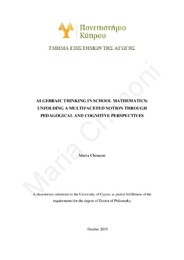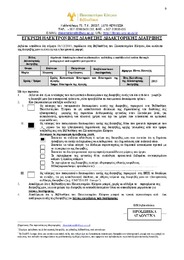| dc.contributor.advisor | Pitta-Pantazi, Demetra | en |
| dc.contributor.author | Chimoni, Maria Ch. | en |
| dc.coverage.spatial | Κύπρος | el |
| dc.coverage.spatial | Cyprus | en |
| dc.creator | Chimoni, Maria Ch. | en |
| dc.date.accessioned | 2016-03-11T07:31:50Z | |
| dc.date.accessioned | 2017-08-03T09:40:03Z | |
| dc.date.available | 2016-03-11T07:31:50Z | |
| dc.date.available | 2017-08-03T09:40:03Z | |
| dc.date.issued | 2015-12 | |
| dc.date.submitted | 2015-12-01 | |
| dc.identifier.uri | https://gnosis.library.ucy.ac.cy/handle/7/39239 | en |
| dc.description | Includes bibliographical references. | en |
| dc.description | Number of sources in the bibliography:111 | en |
| dc.description | Thesis (Ph. D.) -- University of Cyprus, Faculty of Social Sciences and Education, Department of Education, June 2015. | en |
| dc.description | The University of Cyprus Library holds the printed form of the thesis. | en |
| dc.description.abstract | Η εργασία αυτή μελετά την έννοια της αλγεβρικής σκέψης μέσα από πολλαπλά πεδία, έχοντας ως στόχο την διασαφήνιση της έννοιας και την περιγραφή της σχέσης της με διάφορους γνωστικούς παράγοντες. Επιπλέον, η εργασία στοχεύει στη διαμόρφωση πρακτικών διδασκαλίας και μάθησης στο δημοτικό σχολείο που ενθαρρύνουν την ανάπτυξη της αλγεβρικής σκέψης. Ο σκοπός της παρούσας εργασίας ήταν (α) ο εμπειρικός έλεγχος του θεωρητικού μοντέλου του Kaput (2008) για τα βασικά στοιχεία που συνθέτουν την έννοια της αλγεβρικής σκέψης, (β) η εξέταση της σχέσης μεταξύ της αλγεβρικής σκέψης και διαφόρων γνωστικών παραγόντων και διαδικασιών συλλογισμού και (γ) η εξέταση της επίδρασης δύο διαφορετικών διδακτικών παρεμβάσεων στην ενίσχυση της αλγεβρικής σκέψης των μαθητών δημοτικού σχολείου.
Στην έρευνα συμμετείχαν εξακόσιοι ογδόντα τέσσερις μαθητές από τις Δ’, Ε’ και Στ’ τάξεις του δημοτικού σχολείου και την Α’ γυμνασίου. Στους συμμετέχοντες χορηγήθηκαν συνολικά επτά δοκίμια που αξιολογούσαν: (i) την αλγεβρική σκέψη, (ii) τις ικανότητες στα Εξειδικευμένα Δομικά Συστήματα (ΕΔΟΣ), (iii) διάφορα είδη συλλογισμού (Naglieri Non-Verbal Ability test), (iv) τον επαγωγικό συλλογισμό; (v) την εργαζόμενη μνήμη; (vi) την ταχύτητα επεξεργασίας και (vii) τον έλεγχο επεξεργασίας. Επιπλέον, πραγματοποιήθηκαν δύο διδακτικές παρεμβάσεις στις οποίες συμμετείχαν 96 μαθητές της Ε’ δημοτικού. Στην παρέμβαση «Ημι-δομημένες διερευνήσεις σε ρεαλιστικά προβλήματα» συμμετείχαν 42 μαθητές. Στην παρέμβαση «Δομημένες μαθηματικές διερευνήσεις» συμμετείχαν 44 μαθητές. Ο σκοπός των δύο διδακτικών παρεμβάσεων ήταν η διερεύνηση του ενδεχομένου για ενίσχυση της ανάπτυξης της αλγεβρικής σκέψης των μαθητών δημοτικού σχολείου μέσα από καινοτόμες πρακτικές και διαδικασίες.
Τα αποτελέσματα της έρευνας επιβεβαίωσαν το θεωρητικό μοντέλο που προτάθηκε από τον Kaput (2008) σχετικά με τα βασικά στοιχεία που συνθέτουν την έννοια της αλγεβρικής σκέψης. Σύμφωνα με το μοντέλο, η αλγεβρική σκέψη αποτελείται από τρεις διακριτούς παράγοντες: (i) τη Γενικευμένη αριθμητική, (ii) το Συλλογισμό με μεταβλητές, και (iii) τη Μοντελοποίηση ως ένα πεδίο για την έκφραση και την επισημοποίηση γενικεύσεων. Ο παράγοντας «Γενικευμένη αριθμητική» αναφέρεται στη χρήση της αριθμητικής ως ένα πεδίο για τη διερεύνηση σχέσεων δομής στους αριθμούς και τις πράξεις και την έκφραση γενικεύσεων. Ο παράγοντας «Συλλογισμός με μεταβλητές» αναφέρεται στη γενίκευση αριθμητικών ή γεωμετρικών μοτίβων, και τη διερεύνηση και έκφραση σχέσεων συν-διακύμανσης και συμμεταβολής μέσα από διάφορα είδη αναπαραστάσεων (πίνακας, γραφική παράσταση, διάγραμμα, λεκτικές και συμβολικές εκφράσεις). Ο παράγοντας «Μοντελοποίηση ως ένα πεδίο για την έκφραση και την επισημοποίηση γενικεύσεων» περιλαμβάνει τη γενίκευση κανονικοτήτων από μαθηματικοποιημένες καταστάσεις ή φαινόμενα της καθημερινής ζωής. Επιπλέον, τα ευρήματα της εργασίας υποδεικνύουν την παρουσία τεσσάρων κατηγοριών που αντανακλούν διαφορετικά επίπεδα ικανοτήτων αλγεβρικής σκέψης ανάμεσα στους μαθητές.
Τα αποτελέσματα της εργασίας έδειξαν ότι το Αιτιώδες-Πειραματικό Σύστημα, ο Παραγωγικός Συλλογισμός και η Εργαζόμενη Μνήμη εμφανίζονται στη σχέση της αλγεβρικής σκέψης με γνωστικούς παράγοντες σε όλες τις ηλικιακές ομάδες. Για το λόγο αυτό, η σχέση τους εξετάστηκε περαιτέρω μέσα από τη εφαρμογή δομικών μοντέλων στατιστικής ανάλυσης. Το μοντέλο που επιβεβαιώθηκε υποδηλώνει ότι οι σχέσεις του Αιτιώδες-Πειραματικού Συστήματος, του Παραγωγικού Συλλογισμού και της Εργαζόμενης Μνήμης με την αλγεβρική σκέψη είναι αμφίδρομες. Έτσι, η εργασία αυτή προτείνει ένα μοντέλο που περιγράφει την αλγεβρική σκέψη ως έναν πολυδιάστατο παράγοντα που συντίθεται από τους παράγοντες της «Γενικευμένης Αριθμητικής», του «Συλλογισμού με μεταβλητές» και της «Μοντελοποίησης ως ένα πεδίο για την έκφραση και την επισημοποίηση γενικεύσεων». Ο παράγοντας αυτός σχετίζεται με το Αιτιώδες-Πειραματικό Σύστημα, τον Παραγωγικό Συλλογισμό και την Εργαζόμενη μνήμη. | el |
| dc.description.abstract | This study examines the way algebraic thinking might be conceptualized and the way this conceptualization might inform mathematics instruction at the elementary grades in order to enhance the development of algebraic thinking. The purpose of this study was (a) to empirically test a theoretical model about the core aspects of algebraic thinking, (b) to examine its relation to domain-specific processing abilities, different types of reasoning forms and general cognitive processes of mental action (c) to investigate the impact of two concrete instructional approaches on students’ algebraic thinking ability.
Six hundred and eighty four students coming from Grades 4, 5 and 6 participated in the study. Seven different tests were administered: (i) a test measuring algebraic thinking abilities; (ii) a test measuring processes involved in the Specialized Structural Systems (SSSs); (iii) the Naglieri Non-Verbal Ability Test that measures several types of reasoning, (iv) a test measuring deductive reasoning; (v) a test measuring working memory; (vi) a test measuring speed of processing, and (vii) a test measuring control of processing. Two teaching interventionist experiments with 96 fifth graders were also conducted. 42 students participated in the “Semi-structured problem situations” experiment and 44 students participated in the “Structured mathematical investigations” experiment. The purpose of the two interventions was to explore whether it would be possible to engineer instructional interventions that could have positive impact on students’ algebraic thinking.
The results of the study verified the theoretical model proposed by Kaput (2008) about the core aspects of algebraic thinking from K-12 grades. According to the model algebraic thinking can be described using a combination of three distinct but interrelated factors: (i) “Generalized arithmetic”, (ii) Functional thinking”, and (iii) “Modeling as a domain for expressing and formalizing generalizations”. The factor “Generalized arithmetic” refers to the use of arithmetic as a domain for expressing and formalizing generalizations. The factor “Functional thinking” refers to the generalization of numerical or geometrical patterns and the exploration and expression of relationships of co-variation and correspondence that are represented in several ways (with table, graphically, diagrammatically, verbally, symbolically). The factor “Modeling as a domain for expressing and formalizing generalizations” involves generalizing regularities from mathematized situations or phenomena where the regularity itself is secondary to the larger modeling task. Therefore, the findings of the current study verify through empirical data Kaput’s proposed structure of algebraic thinking and also the idea that Kieran (1992) developed about conceptualizing algebraic activity not just as a topic in mathematics curriculum but as a multifaceted activity which encompasses various types of tasks and ways of thinking. Based on the findings regarding the components of algebraic thinking, this study also described four classes of students which reflect broad portraits of students’ abilities and skills that can be used to inform our understanding of the way students develop generalization abilities and move from arithmetical to algebraic ways of thinking.
The findings of the study indicated that the Causal-Experimental System, Serial Reasoning and Working Memory are significant predictors of students’ algebraic thinking in all age-groups. For this reason, their relationship was further examined. The model that was extracted from quantitative data suggests that the Causal-Experimental System, Serial Reasoning and Working Memory are significantly related with algebraic thinking. Thus, this study proposes a model which describes algebraic thinking is a multidimensional factor that is synthesized by the factors of “Generalized Arithmetic”, “Functional Thinking” and “Modeling as a domain for expressing and formalizing generalizations”; this factor is associated with the operations of the Causal-Experimental system, Serial Reasoning and Working memory. | en |
| dc.format.extent | xxxv, 285 [23] p. : ill. ; 30 cm. | en |
| dc.language.iso | eng | en |
| dc.publisher | Πανεπιστήμιο Κύπρου, Σχολή Κοινωνικών Επιστημών και Επιστημών Αγωγής / University of Cyprus, Faculty of Social Sciences and Education | |
| dc.rights | info:eu-repo/semantics/openAccess | en |
| dc.rights | Open Access | en |
| dc.subject.lcsh | Mathematics -- Study and teaching (Elementary) | en |
| dc.subject.lcsh | Algebra -- Study and teaching (Elementary) | en |
| dc.subject.lcsh | Mathematical ability in children | en |
| dc.subject.lcsh | Learning, Psychology of | en |
| dc.subject.lcsh | Effective teaching | en |
| dc.subject.lcsh | Critical thinking in children | en |
| dc.subject.lcsh | Problem solving in children | en |
| dc.subject.lcsh | Reasoning -- Study and teaching | en |
| dc.title | Algebraic thinking in school mathematics : unfolding a multifaceted notion through pedagogical and cognitive perspectives | en |
| dc.title.alternative | Η αλγεβρική σκέψη στο δημοτικό σχολείο: ξεδιπλώνοντας μια πολυδιάστατη έννοια μέσα από παιδαγωγικά και γνωστικά πλαίσια | el |
| dc.type | info:eu-repo/semantics/doctoralThesis | en |
| dc.contributor.committeemember | Xρίστου, Kωνσταντίνος | el |
| dc.contributor.committeemember | Γαγάτσης, Αθανάσιος | el |
| dc.contributor.committeemember | Πόταρη, Δέσποινα | el |
| dc.contributor.committeemember | Καλαβάσης, Φραγκίσκος | el |
| dc.contributor.committeemember | Christou, Constantinos | en |
| dc.contributor.committeemember | Gagatsis, Athanasios | en |
| dc.contributor.committeemember | Potari, Despoina | en |
| dc.contributor.committeemember | Kalavassis, Fragkiskos | en |
| dc.contributor.department | Πανεπιστήμιο Κύπρου, Σχολή Κοινωνικών Επιστημών και Επιστημών Αγωγής, Τμήμα Επιστημών της Αγωγής | el |
| dc.contributor.department | University of Cyprus, Faculty of Social Sciences and Education, Department of Education | en |
| dc.subject.uncontrolledterm | ΑΛΓΒΕΡΙΚΗ ΣΚΕΨΗ | el |
| dc.subject.uncontrolledterm | ΠΡΩΙΜΗ ΑΛΓΕΒΡΑ | el |
| dc.subject.uncontrolledterm | ΓΝΩΣΤΙΚΟΙ ΠΑΡΑΓΟΝΤΕΣ | el |
| dc.subject.uncontrolledterm | ΑΛΓΕΒΡΙΚΗ ΔΡΑΣΤΗΡΙΟΤΗΤΑ | el |
| dc.subject.uncontrolledterm | ΑΛΓΕΒΡΙΚΑ ΕΡΓΑ | el |
| dc.subject.uncontrolledterm | ΑLGEBRAIC THINKING | en |
| dc.subject.uncontrolledterm | EARLY ALGEBRA | en |
| dc.subject.uncontrolledterm | COGNITIVE FACTORS | en |
| dc.subject.uncontrolledterm | ALGEBRAIC ACTIVITY | en |
| dc.subject.uncontrolledterm | ALGEBRAIC TASKS | en |
| dc.identifier.lc | QA159.H56 2015 | en |
| dc.author.faculty | Σχολή Κοινωνικών Επιστημών και Επιστημών Αγωγής / Faculty of Social Sciences and Education | |
| dc.author.department | Τμήμα Επιστημών της Αγωγής / Department of Education | |
| dc.type.uhtype | Doctoral Thesis | en |
| dc.rights.embargodate | 2016-12-01 | |
| dc.contributor.orcid | Pitta-Pantazi, Demetra [0000-0002-9580-5674] | |


